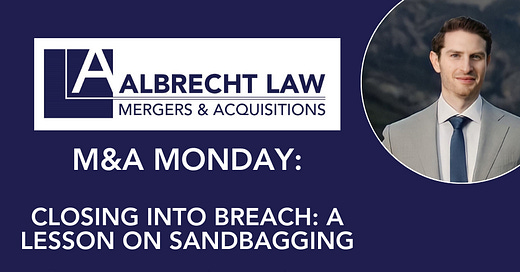Last year, I worked on a deal for a Buyer-client for 3 months. It was Tuesday and we were scheduled to close on Thursday. He said, I just found out from an employee that a key customer is leaving next month. I still want to close the deal, but can I still recoup the losses for this from the seller after closing if I now know about it?
I said, let’s walk this through, and let me give you a mini-lecture on Sandbagging.
You already know from my prior posts (M&A Monday: What and Who Must Stand Behind the Representations & Warranties https://x.com/Eli_Albrecht/status/1816111570189234401), in a typical M&A deal, a buyer can only recover if (i) there was a breach of a seller representation or warranty (a range of promises seller makes about the business), (ii) we negotiate for a Specific Indemnity (M&A Monday: The Power of the Specific Indemnity https://x.com/Eli_Albrecht/status/1790017185085042831), (iii) seller commits fraud or willful misrepresentation (the definition of this is often heavily negotiated, which I will discuss in a further post), or (iv) Seller breaches a covenant (a promise to do something in the future).
In this deal, the Seller had made a binding representation in the purchase agreement that no customers were planning to terminate. Often, a savvy Seller’s lawyer will “knowledge” qualify and/or add materiality to this statement saying, “to my knowledge, no material customer is leaving or has given notice to leave (paraphrase) (practically every word in this representation is negotiated to shift risk from Seller to Buyer, including the definition of Knowledge and the definition of Material).”
Thus, since this Customer Representation was not correct, my client could bring an indemnification claim for any losses resulting from this misrepresentation. Such losses could even include a multiple on the EBITDA decrease as a result and could be decreased from the Promissory Note (it would be subject to caps and baskets, unless it was fraud, intentional misrepresentation, or a fundamental rep: M&A Monday: Caps and Baskets https://x.com/Eli_Albrecht/status/1734314621102669994 and M&A Monday: Sellers' Attempt to Limit Liability: Indemnification Caps: https://x.com/Eli_Albrecht/status/1762228046403170358).
My client said he would prefer not to raise the issue right now. He believed he could bring the key customer back, but would determine after closing if it resulted in a major loss.
This is sandbagging.
Also called, “closing into breach.” Pro-Sandbagging is when a buyer can bring a claim for breaches buyer knew about prior to closing. Anti-Sandbagging is when a buyer cannot bring a claim for breaches known by buyer prior to closing.
A purchase agreement can either include (i) Pro-Sandbagging, (ii) Anti-Sandbagging or (iii) go silent on Sandbagging.
Pro-Sandbagging language is included about 47% of the time and we had included it in this buyer’s draft purchase agreement. Seller’s lawyer accepted our language. Finally, our purchase agreement chose Delaware as our case law (a pro-Sandbagging jurisdiction).
Thus, I told my client that he could bring a claim after closing for the breach of the Customer rep.
States vary widely on whether they enforce Sandbagging and their position if the agreement is silent on Sandbagging. Delaware enforces the letter of the agreement and is pro-sandbagging and will allow a claim for seller misrepresentation even when buyer knew about it before closing. California is generally anti-Sandbagging.
Pro-Sandbagging language is included about 47% of the time, Anti-Sandbagging around 2%, and 51% of the time a purchase agreement is silent on the issue.
The end of the story: my client managed to win back the key customer through a probationary period that turned permanent, EBITDA is up 10% YoY, and he just submitted an LOI for an add-on.
He did not make an indemnification claim, but did thank me for the lecture on Sandbagging.






In sales 'sandbagging' is when you deliberately avoid closing sales in a given measurement period so as to increase sales in the following measurement period (ie: if a rep has already made his number for January, and thus chooses to push a deal in his pipeline to February). Interesting that the term has a completely different meaning in M&A, and that in neither case does the term have anything to do with sand or bags.